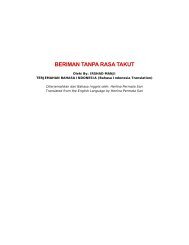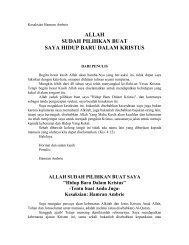A Critical Analysis of 'Real Islam'. Its People ... - Bukti dan Saksi
A Critical Analysis of 'Real Islam'. Its People ... - Bukti dan Saksi
A Critical Analysis of 'Real Islam'. Its People ... - Bukti dan Saksi
Create successful ePaper yourself
Turn your PDF publications into a flip-book with our unique Google optimized e-Paper software.
destructive cycle continues endlessly, ensuring only the continuing economic disadvantage, frustration,<br />
and misery <strong>of</strong> its participants.<br />
By contributing to order, honesty, and fairness, a progressive religion can be an asset to the economic<br />
well being <strong>of</strong> citizens. But when a ‘religion’ propagates ignorance, inefficiency and poverty it becomes a<br />
liability to host societies. Like other totalitarianism systems, Islam acts as an economic hindrance, placing<br />
barriers to ambition, prosperity, and fulfillment <strong>of</strong> human potential. With Islamic education focused (as a<br />
political necessary) on indoctrination, and with other Islamic control mechanisms in society, the kind <strong>of</strong><br />
education which might lead to significant economic reform is not <strong>of</strong>fered. Only a tiny minority <strong>of</strong> the<br />
most privileged escape to western institutions, and then usually choose to stay in the open societies who<br />
host them. Then there is the fact that half the population (women) are prevented from getting an<br />
education, entering the workforce, and contributing to industry. Instead women are regulated to being<br />
nothing more than servants to their husbands and baby factories for Islam.<br />
Paying large percentages in alms is also a heavy burden, as is the personal and social burdens<br />
associated with caring for large numbers <strong>of</strong> minors. Contributing to support local and distant Jihads is<br />
also expected. In fact the opportunity to donate sons and money is irresistible to many Muslims, the<br />
following reveals why;<br />
Allah will give "a far richer recompense to those who fight for him" (Sura 4:96). The Prophet said: "Whatever<br />
one spends to facilitate Jehad, Allah shall give him a reward which will exceed his contribution 700 times."<br />
(Tirmzi, Vol.1, p.697) "He who reared a horse for the sole intention <strong>of</strong> using it in a Jehad, then he will be<br />
rewarded one virtue for each grain he gave the horse as a feed." (Ibn-E-Majah, Vol. 2, p. 172) "A martyr (in<br />
Jehad) is dressed in radiant robes <strong>of</strong> faith: he is married to Houris and is allowed by Allah to intercede for<br />
seventy men (i.e. he is authorized by God to recommend seventy men for entry into paradise, and his<br />
intercession is sure to be granted.) (Ibn-E-Majah, Vol. 2, p. 174)<br />
Consider also the productivity effects <strong>of</strong> a limited workforce who are interrupted 5 times a day for<br />
rather lengthy compulsory prayers, and who fast all day for weeks on end (40 days/year). Then for<br />
merchants, there is undoubtedly fear <strong>of</strong> providing services or products not in complete conformity with<br />
rigid, canonical Islamic restrictions. Such realities are not exactly conducive to market expansion and<br />
employment.<br />
Because <strong>of</strong> the Islamic prohibition to usury (interest rates attached to monetary loans), any who<br />
manage to acquire wealth in Islamic lands have no incentive to invest in or otherwise finance new<br />
businesses ventures. This prevents the flow <strong>of</strong> capital to fund other companies or start-ups, effectively<br />
killing the entrepreneurial spirit.<br />
Of even more significance is the general Islamic disrespect when contracting to non-Muslim entities.<br />
Non-Muslims quickly learn <strong>of</strong> the propensity <strong>of</strong> Muslims to break contracts for self gain, and act instead<br />
to protect their own capital investments by avoiding such adventures in financial recklessness.<br />
Opportunities for cooperation and pr<strong>of</strong>it disappear when comes to be known that Muslims are taught my<br />
Muhammad himself that covenants with infidels can be broken with impunity if it serves the best interest<br />
<strong>of</strong> Islam. But business behavior between Muslims also suffers from an Arabic culture which is tribal and<br />
hegemonic. All such self-destructive business conduct flows as a natural extension <strong>of</strong> the example<br />
exemplified by the caravan raiding Muhammad. The Islamic and/or Arab morality that glorifies<br />
dishonesty and cunning to get gain results in suspicion instead <strong>of</strong> trust. It is a fact that when you remove<br />
trust from business relationships, nothing much will happen. Because personal or institutional risk<br />
becomes untenable, things like long-term-investment, shared-vision, common-goals, cooperative-projects,<br />
and group-achievement become impossible.<br />
The net result <strong>of</strong> all these Islamic cultural effects on markets and industry make economies based on<br />
it much less than competitive in a world economy based on open markets, freedom, and business law not<br />
based on the Qur’an. Lands hamstrung by Islamic principals and culture seem guaranteed to fail<br />
competitively, producing only the kind <strong>of</strong> desperate uneducated, unenlightened core material required to<br />
produce ever more Jihadic foot soldiers. Another consequence <strong>of</strong> the Muslim model is that the trappings<br />
<strong>of</strong> superior economic models in adjoining non-Muslim lands are thereby guaranteed to be superior, which<br />
more <strong>of</strong>ten than not produces jealousy and bitter animosity, if not fodder inspiring conquest and plunder.





